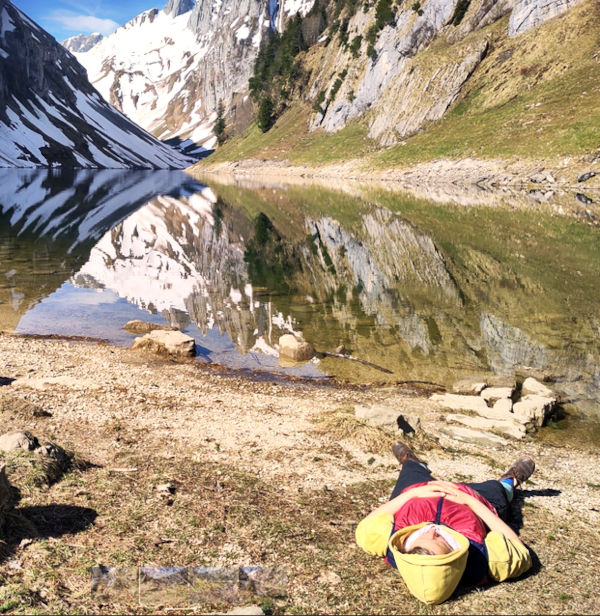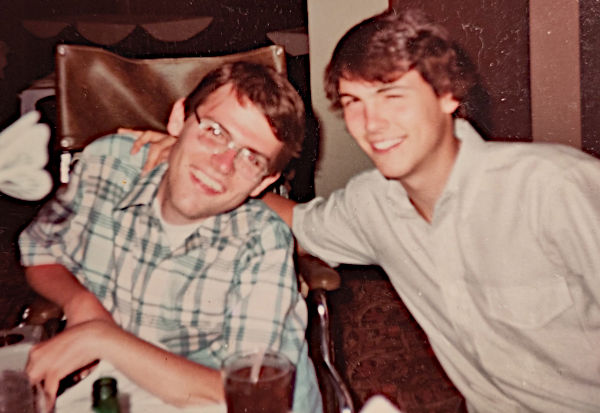My wife and I recently took a magnificent walk in the mountains. The feeling of content known to many after climbing a steep path and arriving at a clear lake was mine as well on this day. The grandeur and majestic stillness of the powerful Alpstein massifs elevated my spirit. I felt easily connected to my breath and to the earth. At the same time, I felt a fondness for all the living beings on it, especially the mountain toads who continually popped their eyes above the surface of the water as if hoping for a conversation.
I drank a bowl of matcha with my wife that day at the shore of the Fählensee (a lake up among the peaks of Appenzell where we live) which enhanced my heart and senses with even more fresh energy. A power within sunk down with the green tea into the water of the lake. My eyes seemed to expand beyond the margins of my physical body, absorbing the powerful emanations from the snow-capped peaks lined by the feathery clouds in the April sky. What a fantastic space to and inhale and absorb this magnificent existence!

I mentioned in my first writing of this blog that helping others was important to me. I also ask myself, what really helps? How do we really help others? I can enjoy this moment by the lake very much, but when I leave, can I really help anyone in this complex world?
I found myself a ‘helper’ very young, as an attendant to my older brother Michael, who was afflicted with Duschenne muscular dystrophy. Pushing his wheelchair, massaging his legs, and carrying his weakened body to a toilet or to a bed were jobs that became very natural to me by the age of 12. In this intimate realm of brotherhood, I felt very useful and connected to someone I loved.

It wasn’t always fun to be the helper. As children and teenagers, my brother and I were constantly arguing. But I never wanted him to suffer. While carrying him, I may have unintentionally banged his foot on a doorway or twisted his ankle a bit hard to get a shoe off. But we both preserved the realm of trust. My hold was gentle but very firm, and Michael never complained about my work. He often thanked me.
When I first heard of Michael’s diagnosis, I wanted to save him. His disease was fatal. He would die between 14 – 20 years-old. I thought I could do something to change or improve the situation. I think this is the root of my search, my desire to help human beings transcend the grim prospects of illness and death.
It is easy now to for me to see how Buddhism appeared in my life. I also see what a tremendous support the teachings and practices have been. The Buddha saw the human condition as suffering unless this transcendence of attachment to the body and its end was consciously experienced. That is the path of the Bodhisattva in Mahayana Buddhism, one who longs to improve the human condition through awareness and realization, and wants to share it. There is more to existence than life and death, and this awareness can transform our being from being completely self-centered, to living more and more in a heart-connection to all that lives.
When I reflect on those moments of intimacy and mutual support during my childhood as Michael’s assistant, I see that they were short, quiet meditations, focused rhythmic dances that imbued both of us with a larger confidence in the significance of life. We loved and we trusted. That is how I felt at the lake with my wife and the frogs.
It wasn’t easy to find that sense of connection to myself or another person since those years with my brother. And yet, something has shifted over time and good things have happened. The longing for transcendence is no longer something I expect to satisfy through reading a book or attending a workshop, by traveling to another country, or by meeting another person. Transcendence arises from within, pacifying the brain’s tendency to worry, solve, fix, and compensate. I experience anger, tears, and pain, but a light continues to connect me to those I miss, those I have lost.
Michael left this world in 1985. He was an extremely intelligent and generous person, but he was not able to avoid the viciousness of his disease, dying at the age of 24. During his life, I think there was healing. I sense Michael’s presence now as a ray of light that shines through my own person. I would like to write more about Michael soon.
My family story probably caused me to have a ‘helper-syndrome’. But with some real help from others who know transcendence very profoundly, I can embrace the ‘helper’ – path that brought me to this moment in these glorious mountains by the lake with my lovely wife and the curious frogs. It is a moment like those trusting, intimate moments I knew from childhood with my brother Michael. The chance to share such moments is very satisfying.
